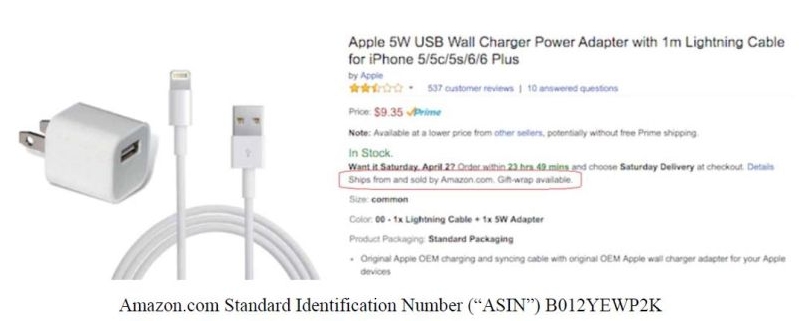
Amazon is now doing a global crackdown on counterfeit products sold on the site. The company says the problem is now getting out of control and Amazon is now paving a solid plan on how to conduct a check-and-balance on millions of products listed on the site.
A recent lawsuit filed by Apple against Mobile Star LLC claims that 90% of branded "official" iPhone chargers posted on the site are indeed fake. Apple did its own surveillance having bought several chargers from Mobile Star's Amazon shopping page.
On the lawsuit, Apple says, "Consumers, relying on Amazon.com's reputation, have no reason to suspect the power products they purchased from Amazon.com are anything but genuine. This is particularly true where, as here, the products are sold directly 'by Amazon.com' as genuine Apple products using Apple's own product marketing images."
Amazon in a press statement, following the Apple lawsuit, says that the company has "zero tolerance for the sale of counterfeits." It has also confirmed that it is now working closely with manufacturers and suppliers on the site.
Fighting against the fakes is going to be Amazon's No. 1 goal for 2017.
Amazon has been in touch with surveillance and investigating teams in the U.S. and Europe to build a list of supplier registry on the site. Once the list is complete, a global crackdown will be initiated. The easiest way to cope, Amazon says, is to get in touch with suppliers so they can confirm on products being sold and the validity of licenses given to online dealers. As it is known, it is unlawful for dealers to sell official products without a brand license, and unofficial products should never be branded as 'official' as this can be misleading.
Other inventors and start-ups have also been victims of counterfeit items sold on Amazon. Randy Hetrick, founder of the TRX Training System, has produced a popular exercise kit that has seen the support of celebrities Jennifer Lopez, Ellen Pompeo, Jaime Pressly, and Mary J. Blige. He began selling his invention on Amazon since 2008 and found great success, but has since succumbed to counterfeits that offer the product at way more affordable prices. By 2014, he says his company lost $100 million due to consumers not able to tell the difference between counterfeits and the real thing.
Hetrick says, "The depressing thing about it is, brands that invest the most to innovate and create new products are the ones that lose the most because they are the ones that counterfeits target."
Amazon is now helping Hetrick file a lawsuit against three fake suppliers. The company is also encouraging official sellers to set up an online store apart from an Amazon store, so buyers are directed into knowing which sellers are real. It is hard work for Amazon, but 2017 is going to be a bigger and more arduous year for the biggest online marketplace.






